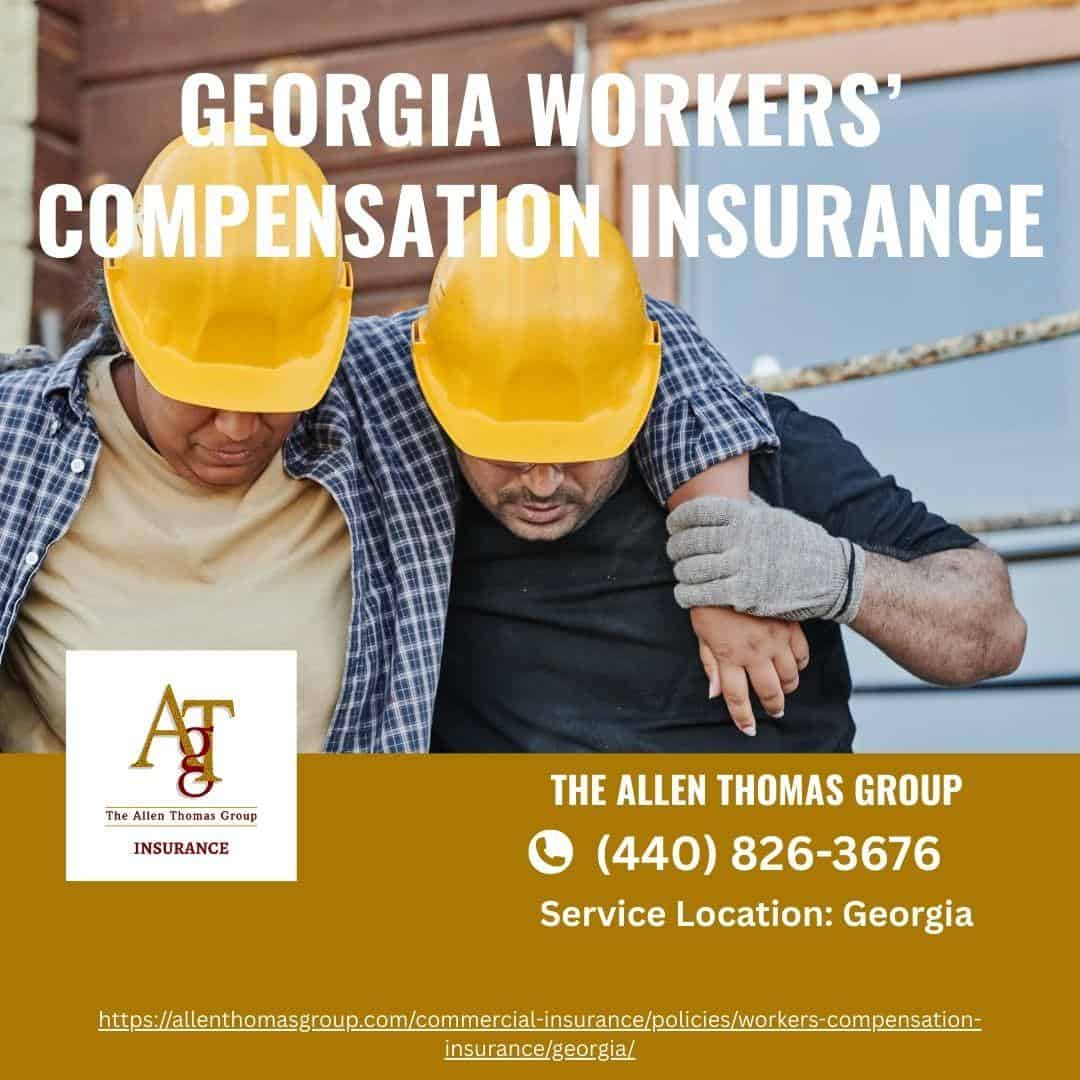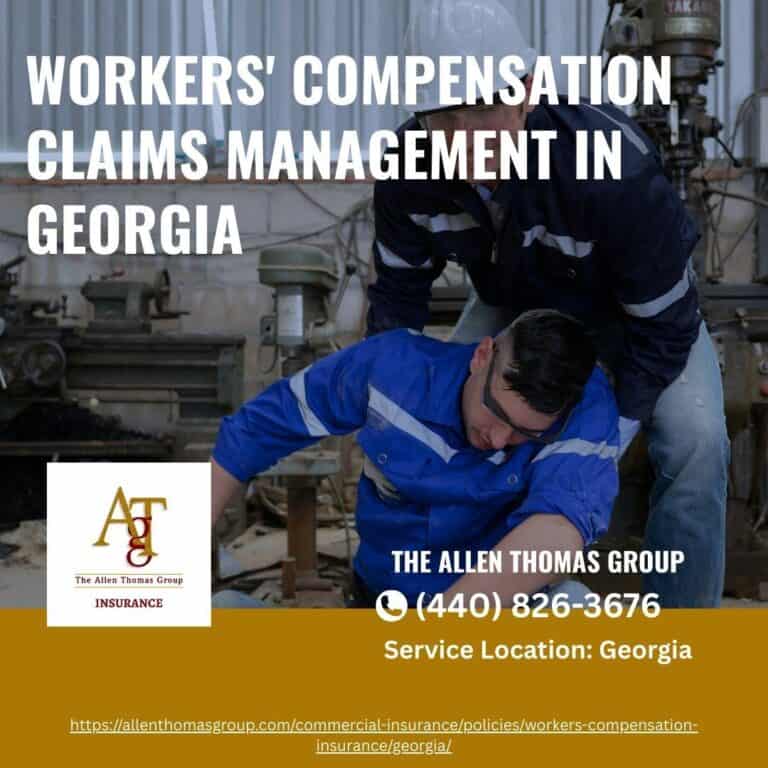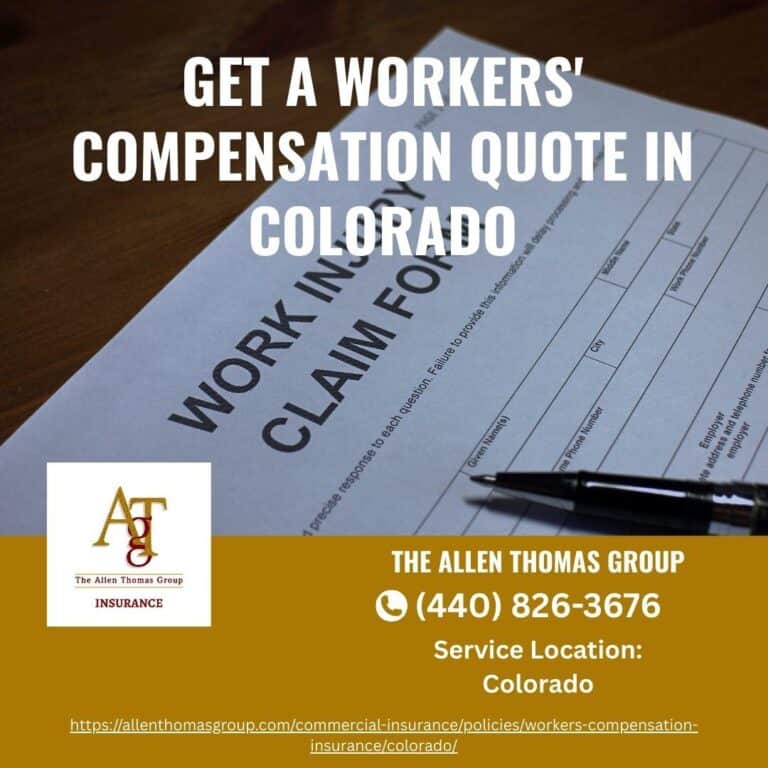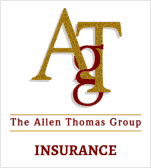Get A Precise Work Comp Insurance Quote For Your Georgia Business
It Just Takes A Few Clicks
Or Give Us A Call At (440) 826-3676

Georgia Workers' Compensation Insurance: Comprehensive Coverage for Employers

Are you a Georgia business owner looking for reliable workers’ compensation insurance protection?
The Allen Thomas Group offers tailored workers’ comp solutions designed specifically for Georgia employers.
With over 20 years of experience in commercial insurance, our team understands the unique challenges businesses in the state of Georgia face when seeking proper coverage for work-related injuries.
Don’t settle for one-size-fits-all. Get workers’ comp insurance in Georgia tailored by people who know it best.
Contact our commercial insurance experts today at (440) 826-3676 for a personalized consultation or get a free quote online.
Table of Contents
Understanding Workers' Compensation Requirements in Georgia
Georgia workers’ compensation law mandates that employers with three or more workers must carry workers’ comp insurance.
This requirement protects both employers and workers from the financial impact of work-related injuries and illnesses.
The Three-Employee Threshold: Who Needs Coverage
If your business, on a regular basis, employs three or more workers in the state of Georgia, you must provide workers’ compensation coverage. This requirement applies to:
- Full-time employees
- Part-time workers
- Seasonal staff
- Regular contractors who aren’t independent contractors
The count includes corporate officers, though they may elect to waive coverage in certain situations permitted in Georgia. Remember that even small businesses meeting this threshold must comply with Georgia’s workers’ compensation laws.
Legal Obligations for Georgia Business Owners
As an employer in Georgia, you have specific legal duties regarding workers’ comp:
- Maintain continuous workers’ compensation coverage
- Post notices about workers’ compensation rights in your workplace
- Report work-related injuries promptly
- File First Report of Injury forms with the Georgia State Board of Workers’ Compensation
- Authorize medical treatment for injured workers promptly
- Maintain accurate payroll and employee classification records
Failing to meet these obligations means employers could face civil penalties, criminal charges, and increased liability exposure. Workers’ comp insurance in Georgia is not optional for qualifying businesses—it’s a legal requirement.
Exemptions for Sole Proprietors and Partners
Not every Georgia business needs workers compensation coverage. Exemptions typically apply to:
- Sole proprietors without employees
- Partners in businesses without additional employees
- Independent contractors (properly classified)
- Railroad carriers
- Farm laborers
- Domestic servants
However, even exempt businesses can voluntarily purchase workers compensation insurance to protect owners and partners from work-related injury costs.
Complete Protection Through Georgia Workers' Compensation Policies
Workers’ comp insurance in Georgia provides comprehensive protection for both employers and employees through a mandatory no-fault system.
Insurance policies vary by state, but Georgia workers’ compensation provides specific benefits designed to protect your business and your employees.
Medical Benefits Coverage for Work-Related Injuries
Workers’ compensation provides medical benefits for employees who suffer workplace injuries. When an employee has work-related injuries, Georgia workers’ comp covers:
- Emergency medical care
- Hospital stays and surgeries
- Doctor visits and examinations
- Prescription medications
- Physical therapy and rehabilitation
- Medical equipment and supplies
- Travel expenses for medical appointments
Georgia law requires employers to cover all necessary medical costs related to workplace injuries with no deductibles or copays for the injured worker.
This coverage can be managed through a workers’ compensation managed care organization for improved efficiency.
Wage Replacement Benefits for Injured Employees
Workers’ compensation in Georgia provides income benefits when employees cannot work due to job-related injuries:
- Temporary Total Disability (TTD) benefits equal to two-thirds of the worker’s average weekly wage, up to the state maximum
- Benefits begin after a seven-day waiting period (unless the disability lasts more than 21 days)
- The compensation rate depends on the employee’s average weekly wage
- Payments continue until the employee returns to work or reaches maximum medical improvement
- An increase in compensation may occur based on cost-of-living adjustments
These wage benefits help injured workers receive workers’ compensation benefits that maintain financial stability during recovery periods.
Disability Benefits: Temporary and Permanent Options
Georgia workers compensation provides different benefit structures based on disability type:
- Temporary Partial Disability (TPD) – When workers return in limited capacity at reduced wages
- Permanent Partial Disability (PPD) – For permanent impairments with scheduled compensation based on body part and impairment rating
- Permanent Total Disability (PTD) – For workers permanently unable to perform any job
Each disability classification follows specific compensation schedules and timeframes under Georgia workers compensation law.
Death Benefits and Dependent Support
When workplace accidents result in fatalities, Georgia workers compensation provides:
- Funeral and burial expense benefits up to $7,500
- Weekly dependency benefits to eligible survivors (spouse, children, or dependents)
- Benefits typically equal to two-thirds of the deceased worker’s average weekly wage
These benefits help families cope with the financial impact of losing a loved one to a workplace accident.
Workers' Compensation Claims Management in Georgia
Proper claims handling is critical for Georgia employers to control costs and ensure injured workers receive appropriate care.
Workers’ comp can help businesses manage the claims process efficiently when you understand the requirements.
Georgia law establishes strict timelines for filing a workers’ compensation claim:
- Employees must report injuries to employers within 30 days
- Employers must report injuries to their private insurance company immediately
- Claims filed more than one year after injury may be barred by statute of limitations
- The Georgia State Board of Workers’ Compensation oversees the claims process
Prompt reporting helps ensure proper medical care, reduces claim costs, and maintains compliance with state regulations. Understanding how workers’ comp works is essential for proper claims management.
When workplace injuries occur, Georgia employers must:
- Complete the First Report of Injury (WC-1) form within 21 days
- Submit the form to their workers compensation insurance carrier
- Provide a copy to the injured employee
- File with the State Board of Workers’ Compensation for injuries causing lost time beyond seven days
Proper documentation protects both the business and the injured worker throughout the claims process.
Georgia’s workers compensation system gives employers certain rights regarding medical treatment:
- Employers may direct injured workers to an approved panel of physicians
- The panel must include at least six qualified doctors from different practices
- Emergency care exceptions apply when immediate treatment is necessary
- Changes in treating physicians require approval
Maintaining a legally compliant physician panel helps control medical costs while ensuring quality care.
Effective return-to-work programs benefit both Georgia employers and employees by:
- Reducing total claim costs and premium impacts
- Speeding worker recovery through productive activity
- Maintaining workplace connections during recovery
- Providing modified duty options when appropriate
The Allen Thomas Group helps Georgia businesses develop customized return-to-work programs that comply with state regulations while protecting company interests.

Georgia-Specific Workers Compensation Coverage Options
Georgia employers have several options for securing required workers compensation coverage.
Traditional Workers Compensation Insurance Policies
Most Georgia businesses obtain coverage through:
- Private insurance carriers like those represented by The Allen Thomas Group
- Commercial policies tailored to specific industry needs
- Coverage that includes both statutory benefits (Coverage A) and employer liability protection (Coverage B)
These policies provide comprehensive protection that meets all Georgia legal requirements.
Self-Insurance Qualification Through the Georgia Self-Insurers Guaranty Trust Fund
Large Georgia employers with strong financial positions may qualify for self-insurance by:
- Demonstrating financial stability and claims-paying ability
- Obtaining approval from the Georgia Self-Insurers Guaranty Trust Fund
- Posting required security deposits
- Maintaining excess insurance coverage
Self-insurance offers potential cost savings but requires significant financial resources and regulatory approval.
Industry-Specific Coverage Plans for High-Risk Sectors
Certain Georgia industries face unique workers compensation challenges:
- Construction
- Manufacturing
- Healthcare
- Transportation
- Agriculture
The Allen Thomas Group specializes in developing industry-specific workers compensation programs that address these specialized needs while maintaining cost efficiency.
Cost Factors Affecting Georgia Workers' Compensation Premiums
Multiple factors determine what Georgia businesses pay for workers’ compensation coverage. Understanding how workers’ comp premiums calculated helps businesses budget appropriately.
Georgia workers’ compensation rates vary significantly by industry:
- Each business is assigned classification codes based on operations
- Higher-risk industries pay substantially higher base rates
- Misclassifications can result in premium audit adjustments
- Multiple classifications may apply to different employee groups
- Workers’ comp also provides different rates based on job classifications within companies
Our agents ensure proper classification of your Georgia workforce to prevent premium overpayment. Your workers’ compensation insurance plan should be tailored to your specific industry risks.
Your company’s claims history directly impacts workers compensation costs:
- Experience modification factors (E-mods) compare your claims to industry averages
- E-mods below 1.0 result in premium discounts
- E-mods above 1.0 increase premium costs
- Claim frequency often impacts ratings more than severity
The Allen Thomas Group helps Georgia employers implement strategies to improve E-mod ratings and reduce premium costs.
Workers compensation premiums are calculated based on:
- Total payroll by classification code
- Applicable rate per $100 of payroll
- Executive officer payrolls (subject to minimum/maximum limits)
- Overtime pay adjustments
- Annual premium audits to verify accuracy
Proper payroll reporting and classification are essential for premium accuracy.
Georgia employers can reduce workers compensation costs through:
- Formal workplace safety programs
- Regular safety training for all employees
- Prompt claims reporting and management
- Drug-free workplace programs that qualify for premium credits
- Return-to-work initiatives that minimize claim costs
Our team helps Georgia businesses implement effective cost control strategies while maintaining comprehensive protection.
Compliance and Risk Management for Georgia Employers
Staying compliant with Georgia’s workers’ compensation regulations helps businesses avoid penalties while controlling costs. Many businesses need workers’ compensation not only for legal compliance but also to fulfill contractual requirements with clients and partners.
Workplace Notice Posting Requirements
Georgia employers covered by workers’ compensation must display:
- Official notices about workers’ compensation coverage
- Information about the panel of physicians
- Instructions for reporting work-related injuries
- Anti-fraud warnings from the Georgia State Board of Workers’ Compensation
These notices must be prominently posted in areas accessible to all employees. Proper posting is one way employers provide workers’ compensation information to their workforce.
OSHA Compliance and Workplace Safety Programs
Workers compensation costs directly correlate with workplace safety:
- OSHA compliance reduces accident frequency
- Safety committees identify and address workplace hazards
- Regular safety inspections prevent common injuries
- Documented training helps defend against violation claims
Our risk management team helps Georgia employers develop comprehensive safety programs that reduce injuries and control insurance costs.
Penalties for Non-Compliance with Georgia Laws
Failing to maintain required workers compensation coverage can result in:
- Civil penalties up to $5,000 per violation
- Criminal charges for willful violations
- Personal liability for business owners
- Stop-work orders that shut down operations
- Loss of exclusive remedy protection against employee lawsuits
The Allen Thomas Group ensures Georgia businesses maintain continuous, compliant coverage.
Exclusive Remedy Protection for Covered Employers
Workers compensation insurance provides Georgia employers with crucial legal protection:
- The “exclusive remedy” doctrine prevents most employee lawsuits for workplace injuries
- Employers gain immunity from negligence claims
- Protection extends to co-workers in most situations
- Exceptions exist for intentional acts or extreme employer conduct
This liability protection represents one of workers compensation’s most valuable benefits for Georgia businesses.
The Allen Thomas Group Advantage for Georgia Workers Compensation
For over 20 years, The Allen Thomas Group Independent Insurance Agency has specialized in helping Georgia employers navigate workers compensation challenges.
We don’t believe in one-size-fits-all insurance. Our approach begins with a thorough analysis of your business operations to identify specific classification and coverage opportunities.
We then develop custom programs tailored to your unique needs, integrating workers compensation with your other insurance coverages.
Throughout our relationship, we conduct regular program reviews and adjustments to ensure your protection evolves with your business.
This tailored approach ensures you get precisely the coverage you need without paying for protection you don’t.
Our team stays current on Georgia’s complex workers compensation regulations. We maintain deep knowledge of state-specific coverage requirements, benefit calculation methods, and medical treatment protocols. Our agents understand the nuances of claims management regulations and self-insurance qualifications that affect Georgia businesses.
This expertise helps your business navigate Georgia’s regulatory landscape with confidence while avoiding common compliance pitfalls that can lead to penalties or coverage gaps.
When workplace injuries occur, The Allen Thomas Group provides immediate claims assistance and direct coordination with adjusters and medical providers. We protect your business against inappropriate claim expansions that can increase costs unnecessarily.
Our team offers representation in disputed claims and guidance through the entire resolution process, from initial filing to final settlement.
Our claims advocacy helps control costs while ensuring injured workers receive appropriate benefits and return to work promptly when medically able.
For Georgia businesses with operations in multiple states, we offer coordinated multi-state workers compensation programs that ensure compliance with varying state requirements.
We provide consistent claims handling across all locations while maintaining centralized policy administration for simplified management.
Our team possesses expertise in reciprocity agreements and extraterritorial coverage provisions that affect businesses operating across state lines.
This comprehensive approach simplifies workers compensation for businesses operating beyond Georgia’s borders, preventing compliance issues that can arise from interstate operations.
Securing the Right Workers' Comp Coverage for Your Georgia Business
The Allen Thomas Group makes obtaining Georgia workers’ compensation coverage straightforward and stress-free. We help businesses understand how much does workers’ compensation insurance cost and how to get the right coverage for their needs.
Workers’ Compensation Insurance Comparison Process
Our thorough approach helps you find optimal coverage:
- Comprehensive needs analysis
- Market access to multiple insurance carriers
- Side-by-side coverage and premium comparisons
- Identification of available credits and discounts
- Expert guidance through selection decisions
This process ensures you receive the best combination of coverage, service, and value for your workers’ comp insurance in Georgia.
Policy Application and Underwriting Timeline
We manage the entire application process:
- Complete preparation of all required documentation
- Coordination with underwriters for optimal classification
- Management of premium deposit requirements
- Verification of policy accuracy upon issuance
- Confirmation of compliance with Georgia workers’ compensation law
Our efficient process minimizes disruptions to your business operations while ensuring you properly carry workers’ comp coverage.
Policy Renewal and Coverage Review Services
The Allen Thomas Group provides ongoing support through:
- Advance renewal planning
- Analysis of classification and rating changes
- Exploration of alternative market options
- Premium audit assistance
- Coverage adjustments as your business evolves
This proactive approach prevents coverage gaps while controlling long-term costs. Workers’ compensation settlements and claims can impact your renewal, so we monitor your experience closely.

Tailored Worker's Comp Insurance Solutions Built For Your Business
We know how frustrating and complex the process of finding the right Georgia business insurance can be and how it slows down your ability to care for your customers. Let us help craft a policy that works for you.

Tell us about your specific needs and we will find the right policy for you.

Review the results of our search.

We will walk you through your new policy step by step.
Our Commercial Insurance Carrier Partners
That allows us to find the best rates for your business.









Get Your Personalized Georgia Workers' Compensation Quote Today
Don’t risk operating without proper workers’ compensation coverage.
Contact The Allen Thomas Group today to:
- Schedule a comprehensive insurance consultation
- Receive a customized Georgia workers’ compensation insurance quote
- Learn how our tailored approach differs from one-size-fits-all options
- Discover potential premium savings opportunities
- Gain peace of mind knowing your business is properly protected
Call us at (440) 826-3676 to speak with a licensed Georgia independent insurance specialist and begin protecting your Georgia business today, or get a free quote through our website.
Get More Insights On Making The Right Insurance Decision For Your Company
Does Georgia Require Workers' Compensation Insurance?
Yes, Georgia law mandates workers’ compensation insurance for businesses with three or more employees, including regular part-time workers. Exemptions exist for railroad carriers, agricultural businesses, and sole proprietors without employees, but most Georgia employers must maintain continuous coverage to avoid civil penalties and potential criminal charges.
How Much is Workers' Compensation Insurance in Georgia?
Georgia workers’ compensation premiums typically range from $0.75 to $5.00 per $100 of payroll, varying significantly by industry classification code and experience modification factor. Construction firms, manufacturing plants, and healthcare facilities generally pay higher rates than retail establishments or office-based businesses due to their elevated workplace injury risks.
How Many Employees are Required for Workers' Comp in Georgia?
Georgia requires businesses with three or more regular employees to carry workers’ compensation insurance coverage. This three-employee threshold includes full-time, part-time, and seasonal workers, as well as corporate officers, though certain officers may elect to waive coverage in specific situations permitted by state statute.
Areas We Serve in Georgia
Acworth
Albany
Alpharetta
Americus
Athens
Atlanta
Auburn
Augusta
Austell
Bainbridge
Barnesville
Belvedere Park
Braselton
Bremen
Brookhaven
Brunswick
Buford
Cairo
Calhoun
Candler-McAfee
Canton
Carrollton
Cartersville
Cedartown
Centerville
Chamblee
Clarkston
College Park
Columbus
Commerce
Conley
Conyers
Cordele
Country Club Estates
Covington
Cumming
Cusseta
Dacula
Dahlonega
Dallas
Dalton
Decatur
Dock Junction
Doraville
Douglas
Douglasville
Druid Hills
Dublin
Duluth
Dunwoody
East Point
Eatonton
Evans
Fairburn
Fair Oaks
Fairview
Fayetteville
Fitzgerald
Flowery Branch
Forest Park
Fort Oglethorpe
Fort Valley
Gainesville
Garden City
Georgetown
Gresham Park
Griffin
Grovetown
Hampton
Hapeville
Hinesville
Holly Springs
Irondale
Jefferson
Jesup
Johns Creek
Kennesaw
Kingsland
LaFayette
LaGrange
Lawrenceville
Lilburn
Lithia Springs
Locust Grove
Loganville
Lovejoy
Mableton
Macon
Marietta
Martinez
McDonough
McRae-Helena
Milledgeville
Milton
Monroe
Morrow
Moultrie
Mountain Park
Newnan
Norcross
North Decatur
North Druid Hills
Panthersville
Peachtree City
Peachtree Corners
Perry
Pooler
Port Wentworth
Powder Springs
Redan
Richmond Hill
Rincon
Riverdale
Rome
Roswell
Sandy Springs
Savannah
Scottdale
Skidaway Island
Smyrna
Snellville
South Fulton
Statesboro
St Marys
Stockbridge
Stonecrest
Stone Mountain
St Simons
Sugar Hill
Suwanee
Swainsboro
Thomaston
Thomasville
Thomson
Tifton
Toccoa
Tucker
Tyrone
Union City
Valdosta
Vidalia
Villa Rica
Vinings
Warner Robins
Waycross
Whitemarsh Island
Wilmington Island
Winder
Woodstock











